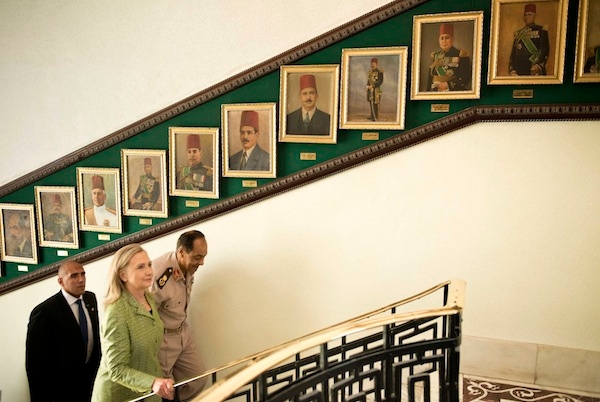Hillary Clinton is holding talks in Israel today after a turbulent weekend in Egypt, ending a diplomatically fraught trip with little obvious benefit. Officially, Clinton was there to open the American consulate in Alexandria after it closed in 1993 due to budget cutbacks, but the subtext was to manage the conflicting aspects of America’s strategic interests in the country.
Clinton met with Mohammed Mursi, a member of the Muslim Brotherhood who is now Egypt’s new President, assuring him of the ‘full authority’ of his office. This was a subtle endorsement at a time when Mursi finds himself locked in tug-of-war with the Supreme Council of the Armed Forces for power. The latter has so far prevented him from forming a civilian government or convening parliament.
For all her outreach to the Brotherhood, the group remains deeply suspicious of American power and the West in general. Whereas Clinton has hurried to Cairo to meet with Mursi – the first major Western politician to do so – it is telling that his first foreign trip was to Saudi Arabia, where he held talks with King Abdullah.
When Clinton later arrived in Alexandria she was jeered by sceptical Egyptians who pelted her motorcade with shoes and tomatoes. ‘Monica, Monica’, they taunted, referring to the former White House intern with whom her husband had an affair.
After meeting with Mursi, Clinton later held private discussions with Field Marshal Mohammed Tantawi, who leads the SCAF and is vehemently opposed to the Muslim Brotherhood. The whole episode reveals just how entangled American interests are.
The White House enjoys a close relationship with the SCAF and is known to have been in constant contact with Tantawi during last year’s revolution. It was through this channel of communication that Mubarak’s departure was orchestrated in an orderly fashion. Yet, Tantawi is furious with Clinton, regarding her visit as rubberstamping the Brotherhood’s administration and undercutting his own efforts to curb their power. She has been told in no uncertain terms to refrain from ‘picking winners’.
Neither of Clinton’s meetings delivered what she hoped. Instead, her failure in Cairo demonstrates the limitations of American influence in a region where the contours of power are still being dramatically redefined. The final landscape is far from set, but it’s difficult to know what Clinton hoped to achieve by visiting Egypt so soon after Mursi’s appointment when he is still unable to form a functioning administration. It was always destined to be a lose-lose situation.






Comments